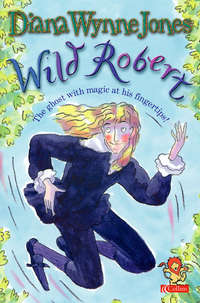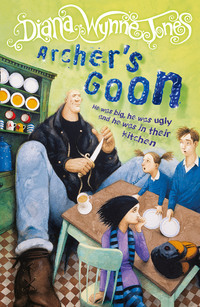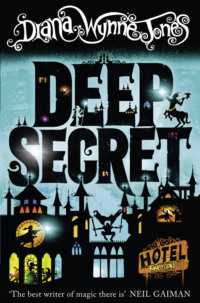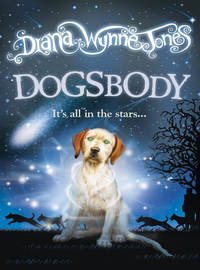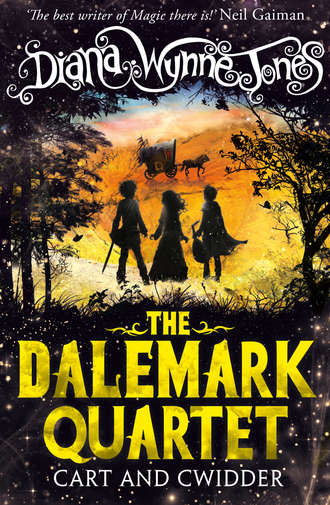
Полная версия
Cart and Cwidder
“Help him into the cart,” Clennen said to Moril.
Moril did his best, but the passenger shook off his helping hand. “I can get in by myself,” he said, “I’m not a cripple.” He climbed in very nimbly and sat on the floor. The canvas cover was half up, and he seemed glad of its shade. Moril looked vaguely after him and hoped it was the heat that made him feel so disagreeable. He knew from bitter experience that someone around Dagner’s age could make life very unpleasant if he was steadily disagreeable for some hundreds of miles. This could be worse than the woman last year. He looked at Brid, who made her squeezed-lemon face back.
Clennen and Flind, meanwhile, were heaving the huge jar through the tailgate of the cart. It took a good deal of effort, and a lot of space once it was in. Olob almost laid his head backwards over his shoulders in an attempt to show his strong disapproval of it.
“Are you really taking our payment in wine?” said Lenina.
“Can you think of a better one?” said Clennen. “My dear girl, there’s only beer to drink in the North! Count your blessings. We’ll broach it this evening, shall we? Or would you rather wait until we’re going through Markind?”
“Oh – this evening,” said Lenina, smiling a little.
Clennen latched the tailgate, waved to Flind, and they went on. Olob made a very expressive business of getting the cart under way again. Brid was quite sorry for him, straining in front of all that extra weight, but everyone else knew that the cart was so well sprung and greased that Olob could hardly feel the difference. Dagner made no bones about flicking him with the whip.
“What a lazy horse!” exclaimed the passenger.
“They’re often the wisest ones,” said Clennen.
The passenger, realising he had been snubbed, put his chin on his knees and sighed gustily. Brid and Moril took turns at eyeing him through the gap in the tailgate. He was burlier than Dagner, though he was younger, and much the same height. But he was more remarkable-looking, because he was a queer combination of dark and fair. His hair was tawny-fair, and there was a lot of it, like a lion’s mane, only rather more untidy, and his eyes were a pale blue-green. But his eyebrows were thick and black and his skin very brown. His nose put them in mind of an eagle. He still had that fed-up look, which they decided must be due to more than the heat.
“Perhaps his grandfather’s dying, and they sent for him, and he doesn’t want to go,” Brid speculated. Moril was content to leave it vague. He simply hoped the passenger would not vent his annoyance on them.
A mile or so further on Clennen said: “We haven’t got your name, lad. There’s a lot in a name, I always think. What is it?”
“It’s Kialan,” said the passenger. “With a K.”
“Even with a K, it’s not half long enough for me,” said Clennen.
“Well, what do you expect me to say? It’s really my name!” the passenger protested.
“I like longer names,” Clennen explained. “Clennen’s too short for me too. Lenina – my wife’s name – is too short. But my children all have good spreading names, because I could choose them myself. The lad driving is Dastgandlen Handagner, my daughter is Cennoreth Manaliabrid, and the one with the red hair is Osfameron Tanamoril.”
Moril ground his teeth and waited for the passenger to laugh. But, in fact, he looked rather awed. “Oh,” he said. “Er, do you call them all that when you want to speak to them?”
“And the lazy-wise horse is Barangarolob,” Clennen added, perfectly seriously, as if he were simply anxious for Kialan to know. Dagner gave a little whinny of laughter, which might have come from Olob. Kialan looked piteous.
“Take no notice,” said Lenina. “They’re Dagner, Brid and Moril for short. And the horse is Olob.”
Kialan looked relieved. He gave another gusty sigh or so and took off his coat. He must have been hot in it, because it was a thick coat, of good cloth. Brid whispered that it must be his best one, but Moril had lost interest in Kialan by then and did not care. Kialan folded the coat – not as carefully as such a good garment deserved – and used it as a pillow while he pretended to go to sleep. Brid knew he was only pretending, because he started up every time any travellers passed them and looked through the opening of the cover to see who they were.
There was not much traffic on the road. Mostly it was slow wagons, which Olob trotted past without any difficulty, sending spurts of white grit from beneath the cartwheels, until Moril, trotting in the rear, seemed to have hair the same colour as Clennen’s. But there were a few horsemen, and these overtook Olob as easily as Olob overtook the wagons. Once, quite a group of riders came past, raising a whirl of white dust, and were scanned by Kialan with great interest. One of the group seemed equally interested in them. He craned round in his saddle as he passed to get a good look at the cart.
“Who was that fellow?” Clennen said to Lenina.
“I couldn’t say,” she answered.
“Funny,” said Clennen, “I seem to have seen him before.” But since the man was a perfectly neutral-looking person, neither dark nor fair and neither young nor old, Clennen could not place him and gave up the attempt.
Shortly after that, as the sun was getting low, Olob left the road of his own accord and jolted the cart among gorse bushes into a heathy meadow. He stopped near a stream.
“Olob thinks this’ll do,” Dagner said to Clennen. “Will it?”
“You don’t really let your horse choose where to stop!” Kialan exclaimed.
“He doesn’t often let us down,” said Clennen, surveying the meadow. “Yes, very nice. Horses have a gift for stopping, Kialan. Remember that.”
The fed-up look settled on Kialan’s face, and he watched, a little scornfully, while Dagner unharnessed Olob and led him off to drink. He watched Moril wiping the dust off the cart and Brid collecting firewood.
“Don’t offer to help, will you?” Brid muttered in his direction.
While Lenina was cooking supper, Clennen fetched the big cwidder down, polished it, tuned it carefully and beckoned Moril. Moril came reluctantly. He was rather in awe of the big cwidder. Its shining round belly was even more imposing than Clennen’s. The inlaid patterns on the front and arm, made of pearl and ivory and various coloured woods, puzzled him by their strangeness. And its voice when you played it was so surprisingly sweet and quite unlike that of the other cwidders. Clennen took such care of it that Moril still sometimes thought – as he had when he was little – that this cwidder was an extra, special part of Clennen, more important than his father’s arm or leg – something on the lines of a wooden soul.
“Let’s have that song of Osfameron’s,” said Clennen.
Moril liked the old songs so little that he was making very heavy weather of learning them. Clennen corrected him, made him go back to the beginning, and twice stopped him in the middle of the second verse. To make matters worse, Kialan came over and stood himself in front of Moril, listening. Moril, in self-defence, went into a dream between two notes, and stopped. He was with the Adon, on a green road in the North.
“Do you really need to teach him?” said Kialan.
“How else,” asked Clennen, “do you think he’d learn?”
Kialan seemed a bit confused. “Well – I sort of supposed they picked it up–from giving shows,” he said.
“Or it grew naturally, along with hair and fingernails?” Clennen suggested.
“No – I – Oh, that’s silly!” said Kialan, and to Moril’s relief, he drifted away. But he drifted back when Moril had finished and Brid took his place. Kialan caught Moril’s sleeve. “I say, you all know all this music, but I suppose you can’t even read and write, can you?”
Moril removed his sleeve. “Of course I can,” he said. “My mother taught us.” Before Kialan could ask any more impertinent questions, he scurried off among the gorse bushes to the stream. He stayed there, lost in vagueness, watching the bright water hurry over the different brightness of the stones beneath, until he heard Brid shouting.
“Supper! Wash, Moril!”
Supper was not very good, and what little bread they had was stale. “I say, this tastes peculiar!” Kialan said, pushing his share about on his plate.
Lenina’s face, which never had much expression, went quite blank. “I meant to buy bread and onions in Derent,” she said. “But there was no time.”
There was a heavy pause. Then Clennen said, “Look, lad, we’ve got to travel more than a hundred and fifty miles together, you and us. It needs a little give and take, don’t you think? I’d hate to have to break a good cwidder over your head.”
The sun was setting then, and the light was red. But Moril thought that this did not entirely account for the colour of Kialan’s face. Kialan, however, said nothing. He silently accepted some of the wine and drank it, but he did not speak again until much later. By then Clennen had become very jolly with the wine. Beaming in the firelight, he leant back against the wheel of the cart and said to Dagner, “Give us that new song of yours.”
“It’s not quite ready yet,” said Dagner. But, since this was not a performance, he willingly fetched his cwidder and picked out a sketch of what Moril thought was a very promising tune. And without a trace of nervousness, he half sang, half spoke the words.
“Come with me, come with me.
The blackbird asks you, ‘Follow me.’
No one will know, no one will know,
Wherever you go, I shall go.
Come with me. Morning spreads,
Clouds are high in milky threads,
The moon looks like a white thumbnail,
Larks are singing up the dale.
The sun is up, so follow me.
I’d like us to go secretly
Along the road, across the hill
Where water runs and woods are still.”
“And then I think the first four lines again,” Dagner said, looking up at Clennen.
“No,” said Clennen. “Won’t do.”
“Well, I needn’t have them again,” Dagner said humbly.
“I mean the whole thing won’t do,” said Clennen.
Dagner looked very dashed. Kialan seemed unable to stop himself saying indignantly: “Why? I thought it was going to be a jolly good song.”
“The tune’s all right, as far as it’s gone,” said Clennen. “But why spoil a tune like that with those words?”
“They’re jolly good words,” Kialan insisted. “I liked them.”
“It’s the words I seem to want,” Dagner said diffidently.
“I see,” said Clennen. “Then in that case don’t utter them again until we’re in the North – unless you want us taken up for rebels.”
Dagner tried to explain. “But I – it wasn’t. I was just trying to say how much I liked travelling in the cart and – and so on.”
“Were you?” said Clennen. “And haven’t you heard the songs the freedom fighters used to sing here the year of the rebellion – oh, it’ll be sixteen years ago now, the year you were born? They never dared say a thing straight out, so it was all put sideways – Follow the lark was one, Free as air and secret another went, and the best known was Come up the dale with me. The lords here still hang a man on the spot for singing words like that.”
“And I do think that’s ridiculous!” Kialan burst out. “Why can’t people sing what they want here? What’s the matter with everyone?”
Brid and Moril looked at his firelit face with interest. It began to seem as if Kialan might be a freedom fighter. They felt they could forgive him much if he was. Clennen, however, simply seemed amused.
“I hope there’s not someone behind the gorse listening to you,” he said. Kialan’s head jerked round towards the nearest looming bush. “See?” said Clennen. “That’s why, in one easy lesson, lad. No one can trust anyone any more. It comes of uneasy rulers paying uneasy men to make the rest uneasy too. It’s not always been like that, you know. Dagner, what did I say outside Derent?”
Dagner’s mind was woefully on his unsuitable song. “Oh – er – something about life being only a performance, I think.”
“I knew I could trust you to get the wrong saying – and the wrong saying wrong,” Clennen said tolerantly. “Anyone?”
“You said the South was once as free as the North,” said Brid. “You said it to me, really.”
“Then remember it,” said Clennen.

AFTER ONE NIGHT attempting to share the smaller tent with Kialan and Dagner, Moril took to creeping into the cart along with Brid and the wine jar. As he told Brid, even the wine jar took up less space than Kialan, and it did not have knees and elbows. Moril had woken up three times to find himself out among the guy ropes in the dew. He resented it. He resented Kialan, and he wished Dagner joy of him. It was hard to tell if Dagner got on with Kialan or not, because he was such an untalkative person. Dagner was like Lenina in that way. It was quite impossible to tell what Lenina thought about Kialan – or, indeed, about anything else.
Kialan, in spite of Clennen’s rebuke, seemed unable to stop making outspoken remarks. “You know, that cart is really horribly garish,” he said, on the second morning. Perhaps he had some excuse. It was standing against the dawn sky, as he saw it, and Moril’s red head was just emerging from it. The effect was undeniably colourful, but Brid was keenly offended.
“It isn’t!” she said.
“I expect you’re too young to have much taste,” Kialan replied. Brid swore to Moril that she was Kialan’s enemy for life after that one.
What Moril resented most – apart from Kialan’s elbows and the fact that Kialan never made the slightest attempt to help with any of the chores – was the superior way Kialan stood by and listened in whenever Moril had a music lesson. Unfortunately he had them fairly frequently in the next few days. They were taking – perhaps for Kialan’s benefit – a more direct route to Flennpass and the North than usual. It meant that they did not pass through any large towns and only two villages. Lenina bought supplies in the first, but they did not perform in either. Clennen took the opportunity to grind away at the old songs with Moril, to keep Brid hard at the panhorn and to rehearse a number of songs with all of them.
Kialan stood by and put Moril off continually. Moril came so to resent it that he took refuge in more than usual vagueness. He would sit on his perch behind the driving seat, staring up the white road unreeling ahead between the grey-green slopes of the South, basking in the hot sun – which never tanned him however long he sat in it – and dream of his birthplace in the North. It always saddened Moril that his father would never go to Hannart because of his disagreement with Earl Keril. He longed to see it, and he had built up in his mind a complete image of what it was like. There was an old grey castle in it, rowan trees and blue hills of a certain spiky shape. Moril saw it clearly. He saw the whole North with it, spread over the grey-green Southern landscape as if it were painted on a window: dark woods and emerald dales, the queer green roads from olden days which led to places that were not important any longer, hard grey rocks, and the great waterfall at Dropwater. In it lived all the stories of magic and adventure that seemed to go with the North. The South had nothing to compare with them.
Hearing Kialan talking behind him, Moril thought that the North had one new advantage. Kialan would leave them there.
“I’ve said that six times now,” Kialan said. “Do you spend all your time a thousand miles away?”
Moril was annoyed. His family could accuse him of dreaminess if they wanted, but Kialan was a stranger. “You’ve no right to say that,” he said.
It was possible Kialan did not realise how annoyed Moril was. “You see,” Brid explained to him later, a good long way behind the cart, “even when you’re angry, you always look so sleepy and – and milky, that he probably didn’t even notice you were attending. Not,” she added tartly, “that he’d have noticed anybody’s feelings but his own, mind you.”
What Kialan had replied was: “Oh, good grief! I know you’re the fool of the family by now, but you don’t have to be rude as well as stupid!”
“And the same to you!” Moril retorted, and took Kialan completely by surprise by butting him in the stomach. Kialan fell backwards heavily – and painfully, Moril hoped – on to the wine jar. Whereupon Moril found the prudent thing to do was to hop out of the cart double quick and scud off down the road behind it. And for the rest of the day he was forced to walk well in the rear for fear of Kialan’s vengeance.
But it was Clennen who took the vengeance. When they camped for the night, he beckoned both Kialan and Moril up to him. “Are you two going to make up and apologise?” he enquired. Moril looked warily at Kialan, and Kialan looked most unlovingly back. Neither answered. “Very well then,” said Clennen, and banged their heads together. Nothing seems harder than another person’s head. Moril could only hope that Kialan had seen as many stars as he had. He was rather surprised that Kialan did not say anything to Clennen. “Next time, I’ll do it harder,” Clennen promised. Then, as if nothing had happened, he went on to give Moril a lesson. And to Moril’s annoyance, Kialan stood by and listened just as usual.
The following day they reached a market town called Crady, and it came on to rain – big warm drops that seemed like part of the air and very little to do with the moist white sky. The raindrops made dark brown circles in the dust of the road and raised a delicious smell of wet earth. But it meant everyone crowding into the cart to change in great discomfort. Moril was not surprised that Kialan got out.
“I’m not really interested in your show,” he said to Clennen. “I’ll meet you on the other side of Crady, shall I?”
“If you like, lad,” Clennen said cheerfully. Brid and Moril exchanged seething glances in the hot dim space under the cover and wondered why Clennen did not box Kialan’s ears for him. But the only thing which seemed to perturb Clennen was the rain. “We shall have no audience in the open,” he said. “I’ll see what I can do. We’ll go in with the cover up.”
It was lucky that they did. By the time they came to the marketplace, the rain was coming in white rods and bouncing up off the flagstones. Olob was wearing his most long-suffering expression, and there was not a soul in sight. But Clennen had friends in Crady, just as he had everywhere else. Half an hour later they were installed under the great beams of a warehouse on the corner of the marketplace, and a crowd, damp but interested, was gathering into it.
They gave an indoor kind of show. After Clennen had told everyone about Hadd and Henda, the Waywold money, the price on the Porter’s head and the cost of corn in Derent, and the usual messages had been handed out, they sang songs with a chorus that the audience could join in. Dagner did his part early. Then, when good humour and attention were at their peak, Clennen told one of the old tales. This pleased Moril highly. He always felt rather too hot indoors, and playing the cwidder made him hotter still. But during a tale he was only needed once or twice. All the stories had places where there was a song. For the rest of the time Moril could sit on the dusty chaff of the floor with his arms wrapped round his knees and drink the story in.
Clennen chose to tell a branch of the story of the Adon. It had to be only a branch because, as Clennen was fond of saying, stories clustered round the Adon and Osfameron like bees swarming. The songs which came in where the story needed them were the Adon’s own, or Osfameron’s. Moril always thought the old songs sounded rather better set in their proper stories, though he still wished the silly fellows had tried to sing more naturally. But their doings made splendid tales. Moril listened avidly to how Lagan wounded the Adon and the wound would not heal until Manaliabrid came out of the East to him. Then came the story of the love of both Lagan and the Adon for Manaliabrid, and how the Adon fled with her to the South. Lagan followed, but Osfameron helped them by singing a certain song in the passes of the mountains, so that the mountains walked and blocked the way through. And Lagan was forced to turn back.
Here Clennen lowered his rich voice to say: “I shall not sing you the song Osfameron sang then, for fear of moving the mountains again. But it is true that since that day the only pass to the North is Flennpass.”
The Adon for a time roamed the South with Manaliabrid, singing for a living, until Lagan found where they were. Then he stole away Kastri, the Adon’s son by his first wife, and the Adon followed. But Lagan was something of a magician. He made Kastri invisible and took on the shape of Kastri himself. And when the Adon came up to him, unsuspecting, Lagan stabbed him through the heart.
Here came Manaliabrid’s lament, which Moril was supposed to sing. He took up his cwidder for it, glancing as he did so into the warm blue-grey depths of the barn at the attentive audience. To his surprise, Kialan was there. He was standing at the back, very wet and draggled, listening with as much interest as anyone there. Moril supposed he had decided he preferred a performance to a soaking after all. And he was annoyed with Kialan for coming. His head was full of grand things, journeys, flights, fighting and the magic North of once-upon-a-time. Kialan was the everyday world with a vengeance. Moril felt as if he had a foot on two different worlds, which were spinning apart from one another. It was not a pleasant feeling. He took his eyes off Kialan and concentrated on his cwidder.
Then Clennen went on to how Manaliabrid asked Osfameron for help. Osfameron sang, and made Kastri visible. Then he took up his cwidder and journeyed by a way that only he knew, to the borders of the Dark Land. There he played such music that all the dead crowded in multitudes to hear him. Once they were gathered, Osfameron sang and called the soul of the Adon to him. And – this part always gave Moril a delicious shiver – Clennen once more lowered his voice to say: “I shall not sing you the song Osfameron sang then, for fear of calling the dead again.”
Osfameron led the Adon’s soul back and restored it to his body. The Adon arose, defeated Lagan, and reigned as the last King of Dalemark. He was the last king because Manaliabrid’s son, who was to have been king after him, chose instead to go back to his mother’s country. “And since that time,” said Clennen, “there have been no kings in Dalemark. Nor will there be, until the sons of Manaliabrid return.”
Moril gave an entranced sigh. He had hardly the heart, after such a story, to join in Jolly Holanders, and he only managed to sing with an effort. After it he crept away to the other end of the barn to avoid the usual crowd, and sat under the cart, brooding, while Clennen greeted his friends and Dagner failed to explain how he made up songs. If only such things happened nowadays! Moril thought. It seemed such a waste to be descended from the singer Osfameron, who knew the Adon and could call up the dead, and to live such a dull life. The world had gone so ordinary. Compare the Adon, who lived such a splendid life, with the present-day Earl of Hannart, who could think of nothing better to do than to stir up a rebellion, so that he dared not show his face in the South. Or you only had to think of the difference between that Osfameron, Moril brooded, and this one, Osfameron Tanamoril, to see how very plain and ordinary people had become lately. If only –
Here the plain and ordinary life interrupted in the person of Lenina, carrying the chinking hat to the cart. She was followed by the usual kind of murmuring gentleman. “And it must be sixteen years now …” this gentleman was murmuring.


